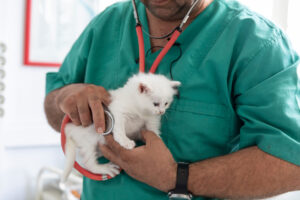Cats have a reputation as self-sufficient and independent beings. This perception, though often true, has created a myth cats do not need to see their veterinarian as often as dogs. This myth is false. Cats do need to see their veterinarian regularly. Their health and quality of life benefit greatly from regular veterinary care.
Kittens like all newborns need to visit the veterinarian often for the absolute best start to life. They should visit their veterinarian once every three to four weeks for the first 16 weeks. Depending on lifestyle, family history and disease common to where you live, vaccines will begin at 6 to 12 weeks of age.A series of vaccines which protect against infectious and life threatening diseases are appropriate. Three to four weeks later, a second set of vaccines are administered. During this stage, your veterinarian will check for gastrointestinal parasites from a stool sample.

Your veterinarian will examine your kitty’s heart, lungs, eyes, mouth and skin looking for congenital abnormalities and other signs of ill health. Between 8 and 12 weeks of age, your kitten should undergo testing for feline leukemia virus and feline immunodeficiency virus. A rabies vaccine is given at three months with a booster administered at one year of age. Spay or neuter should be performed between 6 and 12 months of age. If there are concerns regarding a kitten’s socialization, raising them at any one of these appointments is encouraged.
Adult cats between the ages of 1 to 9 years should undergo a comprehensive examination by their veterinarian annually. During this annual appointment, a stool sample check for parasites should be conducted. In addition, vaccines will be updated as needed. Other topics you should discuss with your veterinarian include any medications or supplements your cat is receiving. It is also a good idea to let your veterinarian know what brand of food your cat eats. Having this information will help your veterinarian better understand your pet’s health. It will also help in formulating an appropriate treatment plan.
Annual wellness bloodwork on your adult cat will facilitate in early detection of disease. This information is important and helps your veterinarian to better address health issues before they become more serious. During these annual exams, your cat’s weight and body condition will also be assessed. Cats who are overweight may have mobility and life quality issues which need to be addressed. Your adult cat’s oral health will also be evaluated. Signs of plaque and periodontal disease are identified at annual exams. 85% of cats six years and older show signs of periodontal disease. If your cat goes outside, he should be on year round heart worm and flea and tick prevention.

Senior cats are those who are ten years and older. It is recommended senior cats undergo an examination by their veterinarian two times each year. Keep in mind cats are very secretive about pain and discomfort. The sooner any problem is identified the better quality of life your cat will enjoy. Annual bloodwork including urinalysis is highly recommended for senior cats. Early detection of health issues or disease is key to a healthy and long life for your senior cat. In addition, your veterinarian will recommend appropriate vaccines.
If your senior cat suffers from obesity, arthritis, liver problems or kidney issues, they may need to see their veterinarian more often. If your cat is unwell or you suspect something is not quite right, you should schedule an appointment with your veterinarian and not wait until her regularly scheduled bi-annual appointment. Issues including bleeding, vomiting, diarrhea, loss of appetite, lethargy, depression, decreased water intake, weight loss, increased vocalization, avoidance or limping could be a sign your senior cat is ill.
Other issues of importance in maintaining your cat’s health involve whether your cat is an indoor cat only or an indoor/outdoor cat. Cats who spend time both indoors and outdoors face more risks including parasites, predators and becoming lost. A risk for outdoor cats is feline leukemia which spreads from cat to cat. Proper dental care is very important to your cat’s well being. Periodontal disease can cause difficulty eating and is painful. As your cat’s age advances, pay close attention to behavior changes. Is your cat drinking more water than usual? This could be a sign of kidney problems or diabetes.

Another misconception some have about indoor cats is they are protected, not exposed to danger and therefore do not require vaccines. This is a myth. All cats need regular rabies and distemper vaccines.
Significant lifestyle changes can affect when your cat should visit their veterinarian. If your indoor cat is gaining outdoor access or if you and your cat are moving, this is an ideal time to schedule a check-up with your veterinarian. Doing so before a big change will help you identify strange behavior directly resulting from a lifestyle change versus a health issue. Establishing a relationship with your veterinarian allows her to get to know your cat so an effective personalized schedule for check ups is tailored specifically to meet your cat’s needs.

